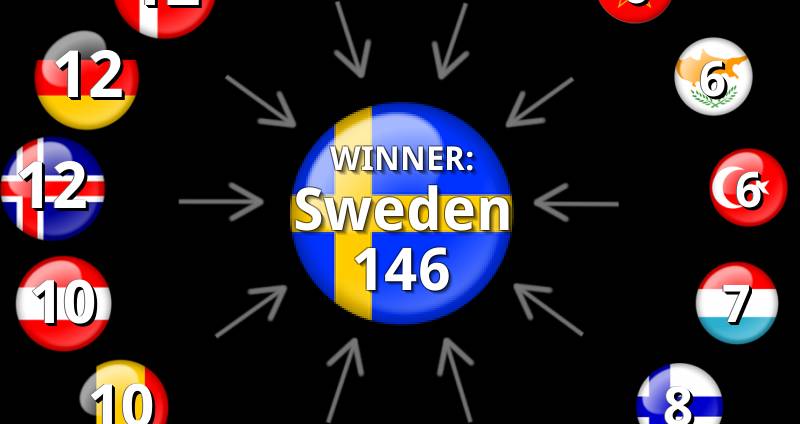Deciphering The Eurovision Voting Process: Points, Scores & Results

Table of Contents
The Two Voting Systems: Jury and Televoting
The Eurovision Song Contest uses a dual voting system to determine the winner: a professional jury and televoting. This blend aims to balance expert opinion with the preferences of the general public, creating a more comprehensive and hopefully fairer Eurovision results outcome.
- Juries: Each participating country assembles a jury of five music professionals. These experts, chosen for their musical expertise and impartiality, score each performance based on criteria such as vocal performance, song composition, and stage presentation. Their scores are kept secret until the final reveal.
- Televoting: Viewers in each participating country can vote for their favorite entries via telephone, SMS text message, or dedicated Eurovision apps. This allows a direct expression of public opinion and adds a significant element of unpredictability to the Eurovision points allocation.
- Weighting and Integration: Both the jury and televote scores are weighted equally. This 50/50 split is designed to mitigate potential bias from either system and ensure a balanced reflection of both expert and public opinion. The Eurovision voting system has undergone changes over the years; for example, earlier versions relied solely on national juries. These changes have been implemented to improve transparency and address concerns about voting biases. The current system, implemented in 2016, aimed to improve fairness and accuracy in calculating the Eurovision scores.
How Points Are Awarded
The heart of the Eurovision voting process lies in its point allocation system. The Eurovision points awarded influence the final Eurovision results and the overall excitement of the competition.
- Top 10 Scoring: Each country awards points to its top ten favorite songs from both the jury and televote results. This ensures a wider range of songs are recognized, not just the top three.
- Point Scale: Points are distributed according to a predetermined scale: 12 points for the favorite, 10 for the second favorite, and so on, down to 1 point for the tenth favorite.
- No Self-Voting: Crucially, a country cannot award points to its own entry. This rule prevents self-promotion and ensures a more objective Eurovision points allocation.
- Total Score Calculation: The final Eurovision scores for each song are the sum of all jury and televote points received from all other participating countries.
Controversies occasionally surround point allocation, with accusations of bloc voting or neighboring countries consistently awarding high points to each other. The suspense builds as the scores are revealed, with spokespersons for each country announcing their points one by one, adding to the dramatic tension that defines the Eurovision Song Contest.
Understanding the Eurovision Results & Scoreboard
The final Eurovision results are presented on a scoreboard, a crucial component of the Eurovision Song Contest experience.
- Scoreboard Display: The scoreboard clearly displays each country's total points, broken down into jury and televote scores for complete transparency.
- Ranking: Countries are then ranked according to their total points, with the highest score claiming victory.
- Tie-Breakers: Although rare, pre-determined tie-breaker criteria exist should two or more countries have identical final scores. These often involve looking at which nation received more 12-point scores, or potentially other factors laid out in the Eurovision rules.
The announcement of the results is a spectacle in itself. Each country's spokesperson delivers their points, adding a layer of anticipation. The build-up to the announcement of the final scores creates a thrilling climax. The final Eurovision results often produce surprises, upsets, and memorable moments.
Analyzing Eurovision Voting Patterns
Analyzing voting patterns reveals interesting insights into the Eurovision Song Contest.
- Neighbor Voting and Bloc Voting: Neighboring countries sometimes show a tendency to vote for each other (neighbor voting), while groups of countries consistently support certain acts (bloc voting). These patterns can be attributed to shared cultural affinities, linguistic similarities, or even political alliances.
- Influencing Factors: Political relations, cultural similarities, and shared musical tastes clearly impact voting patterns. Sometimes, a nation's voting habits can be clearly influenced by existing political tensions. Similarly, a shared musical background or linguistic similarity could influence support for a certain entry.
- Social Media's Impact: Social media plays an increasingly significant role, influencing public opinion and impacting how the Eurovision results are perceived. Online campaigns and discussions can sway public votes, adding another layer of complexity to the competition.
Conclusion
The Eurovision Song Contest voting system is a complex blend of professional judgment and popular opinion, aiming for a fair and representative outcome. Understanding the process – from the allocation of jury and televote points to the final tally – adds another layer of enjoyment to this vibrant international competition. The blend of Eurovision points, scores, and results creates a thrilling competition year after year.
Call to Action: Ready to dive deeper into the intricacies of Eurovision voting? Explore past Eurovision results and analyze voting patterns to become a true Eurovision voting expert! Learn more about the nuances of Eurovision points, scores, and results – your knowledge will enhance your next Eurovision viewing experience!

Featured Posts
-
 The Reality Behind Trumps Aerospace Deal Numbers
May 19, 2025
The Reality Behind Trumps Aerospace Deal Numbers
May 19, 2025 -
 Srimandir Visit Footage Of Youtuber Jyoti Malhotra Puri Released During Espionage Investigation
May 19, 2025
Srimandir Visit Footage Of Youtuber Jyoti Malhotra Puri Released During Espionage Investigation
May 19, 2025 -
 I Kyriaki Ton Myroforon Sta Ierosolyma Istoria Paradoseis Kai Symvola
May 19, 2025
I Kyriaki Ton Myroforon Sta Ierosolyma Istoria Paradoseis Kai Symvola
May 19, 2025 -
 Court Ruling Threatens Londons Vibrant Events Scene Wide Awake Mighty Hoopla Cancelled
May 19, 2025
Court Ruling Threatens Londons Vibrant Events Scene Wide Awake Mighty Hoopla Cancelled
May 19, 2025 -
 The Importance Of Interdisciplinary And Transdisciplinary Research
May 19, 2025
The Importance Of Interdisciplinary And Transdisciplinary Research
May 19, 2025
